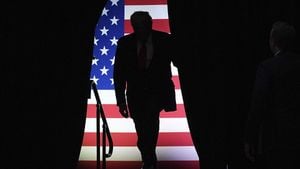MSNBC's "Morning Joe" co-hosts Joe Scarborough and Mika Brzezinski have found themselves at the center of intense scrutiny and backlash following their recent meeting with President-elect Donald Trump at his Mar-a-Lago estate. This dramatic rendezvous, their first in seven years, was meant to mend fences, but the fallout has not been pretty.
After Trump triumphed over Vice President Kamala Harris in the 2024 election, Scarborough and Brzezinski described their meeting as part of efforts to reboot communication with the incoming administration. They insisted it wasn’t a political endorsement but rather an attempt to engage with the president-elect.
Critics were quick to pounce on their meeting. Many questioned whether this was truly about reopening channels or whether it stemmed from fears of possible retribution from Trump and his administration — something he has been known to threaten against perceived opponents. Reports indicated both hosts felt they might face governmental and legal harassment, reflecting the alarming climate surrounding Trump's return to power.
Sources close to the situation reported Scarborough’s belief being face-to-face with Trump was “a no-brainer.” Others from the network echoed this sentiment, hoping this interaction could lessen any potential backlash. Yet, the decision triggered substantial outrage, heating up tensions between the show's fanbase and the network. Viewership dipped drastically, with around 38% of the audience aged 25-54 reportedly tuning out after the announcement of the meeting.
The numbers from Nielsen were telling—viewership for "Morning Joe" typically increases from 6 a.m. to 10 a.m., but many viewers left almost immediately following the early-morning announcement. The visible shift raised serious concerns among the show's producers and MSNBC as they grappled with the backlash.
Following the meeting, accusations flew from opposition figures and fellow media personalities alike, decrying the hosts as hypocrites and questioning the legitimacy of their decision to sit with Trump after years of vocal criticism. Former MSNBC host Keith Olbermann, for example, harshly labeled their move as “fawning, humiliative, and network-destroying.”
On social media, commentators including attorney Katie Phang chimed, declaring, “Normalizing Trump is a bad idea. Period.” This sentiment echoed broadly, with many expressing their outrage and disappointment at the hosts’ choice.
Scarborough attempted to defend the decision during their following broadcast, noting they had received supportive phone calls from various parties, as if to highlight the apparent divide between online criticism and real-world sentiments. “We were flooded with phone calls from people all day, literally around the world... all very positive, very supportive,” he maintained, with Brzezinski by his side, pushing for patience as they moved forward.
Yet even as they described this support, many were left wondering how much of it was simply due to the perceived necessity of aligning with Trump. Some current and former employees within MSNBC openly voiced their discontent, fearing this marked the network's capitulation to Trump’s narrative.
The atmosphere surrounding the hosts and their decision has only intensified. Tensions continue to bubble as the media, the audience, and political insiders dissect the potential ramifications of such engagement with the controversial figure Trump has become.
Despite Scarborough and Brzezinski’s reassurances, critics argue they remain out of touch with the realities of the audience they aim to connect with. The meeting has undoubtedly become more than just another segment for ratings; it has turned the spotlight on what many see as the capitulation of traditional journalism to populist pressures.
Given the history between Scarborough, Brzezinski, and Trump — once personal acquaintances during his time as governor of Florida — the reunion feels particularly loaded. Their road to reconciliation has been paved with mutual disdain, public insults, and scathing comments across social media platforms over the years, adding layers of complexity to their recent decision.
For viewers who felt betrayed, the meeting signified not merely the professional interests of reporting but perhaps reflected the more personal tug of fear and safety amid Trump’s return. This dynamic takes center stage within the increasingly fraught political media environment, with journalists caught between the ideals of their profession and the harsh realities of contemporary politics.
Slip-ups from mainstream media figures like Scarborough and Brzezinski tend to resonate loudly — reminding the public of the fine line they must walk between access journalism and earnest criticism. With the stakes hovering around notions of credibility and integrity, it's clear the fallout from this encounter will be felt for some time.
Trump's presidency has set new precedents, and as MSNBC grapples with this situation, it raises questions not only about responsibility but also about the role of journalism moving forward.



